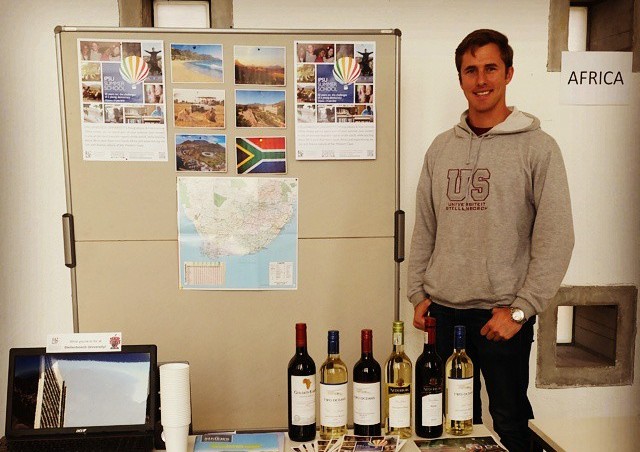Pre-Departure:
After an almost 24 hour flight from sunny Cape Town via Dubai, I arrived in the beautiful, icy cold Frankfurt, Germany. I got lost a few times in one of Europe’s biggest Airports, but eventually found the meeting point where the driver and another student were waiting for me. From there we cruised at a casual 200km/h on the Autobahn to the small village of Oestrich-Winkel, situated in the beautiful Rheingau region, famous for its Weinberge (wine mountains) next to the even more famous Rheine River.
Before I go into more detail about my experience, I need to make clear what a huge job it is to get to this point of your exchange! In short, hours and hours of preparation go into this. Stellenbosch University has its own criteria that need to be met before you are even considered for an exchange student. Once you have the green light, you start preparations for the host university, who also has another lot of boxes to be ticked. And once that is done, the inevitable visa application to the country you are visiting is the next hurdle.
Each country has their rules and paperwork they require before a visa is issued and it takes a while to be processed. My advice would be to apply for your visa application as soon as you have all the required documents. I received mine on the way to the airport on the day of departure and I applied 2 months before! I had some hiccups with police clearance, as the paperwork got lost somewhere and I had to wait for a reprint and for them to send it again. In the end, all worked out fine and I got my visa.
Having arrived at the house which I was going to stay for the duration of the exchange, I rushed to meet most of the other international students at the welcoming function arranged by the EBS. We had dinner in an old wine cellar where we had some wine and typical German food. There was an absolute fruitcake of nationalities sitting around of which French and Canadians made up the largest numbers. It was an eye opener hearing the stories from around the world and just getting all the different perspectives on some things in life.
Oestrich-Winkel is quite a unique, quiet little town. The oldest building in the town dates back to the 11th century and most of the buildings hasn’t changed much since the 1600’s! The people who live there can barely speak English, which made learning a new language an urgency! It would come in more handy than you might think.
Experience at the Host University:
The European Business School is a well-known private university in Germany. It is quite expensive for German students to study there, but there is a reason for this. Most of the lecturers come straight from the industry to the lecture room, and therefore some of my classes were on Saturday mornings or Friday afternoons, when they had finished their work. I did my Masters in Logistics at the EBS and my lecturers all came from the German automotive industry. We did many practical case studies and had to deal with some real life situations while doing that. This gives the EBS a good and well-deserved reputation.
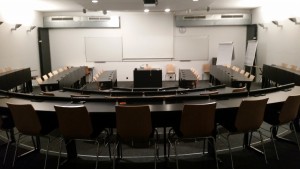
The campus and classrooms are very small compared to that of US, but it makes the classes and lectures much more personal. The lecturers asked the students questions throughout the lecture, which counts as class participation. German students are used to this and like to answer all the questions, so you have to step up and put your hand in the air to score a mark or two.
We often had to do projects in groups. To work with students from different cultures, languages and work ethics is quite an interesting challenge! But it is also very rewarding. In one of the groups we were four students: me, from SA, and three from France. The difference in approach to the problem was rather amusing! In the end we followed a basic and practical pattern I was taught at US and we scored a really good mark.
Academics aside, the other reason why most students apply for an exchange is to experience the difference of culture and life on the other side of the planet. The exchange students from all the other universities become your family as time goes by. Most of your time and experiences are shared with them. We had house parties, scavenger hunts in Frankfurt, went for bowling, wine tasting, hiking, carnival, clubbing, traveling and had BBQ’s next to the Rheine. This is just to name a few. The EBS has a student council which organises events for the incoming exchange students and you determine to which extend you are going to participate. There were indeed some students who sat at home and watched TV series and focused on academics. Please do not be like those! Rather take on a ‘work hard, play hard’ approach to your exchange experience and really make the most of it!
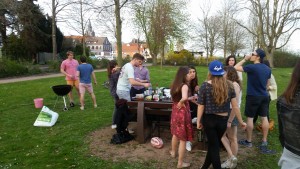
Traveling in Europe is quite convenient, reasonably priced and very accessible. With your student card, you get a public transport pass which costs €127. It sounds like a lot, but it is worth every sent. One trip to Frankfurt and back costs €18, while this card gives you unlimited travel from January till end of July in the whole region, covering a 150km radius. I made a list of things and places I wanted to experience and see in Europe and tried to fit it in with the open spots on my calendar. PM2AM Student Trips is a company that organises weekend trips to places like Vienna, Amsterdam, Switzerland and Venice, just to name a few. I joined them on two to Prague and Vienna. The prices differ between €110 and €130 and include accommodation, a city tour, your bus ride and some of the meals. Take a few of your new friends along on one of these trips and you will have an extraordinary experience!
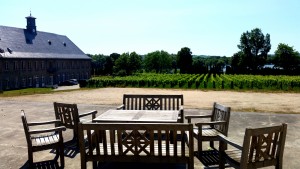
Living in the small Town of Oestrich-Winkel starts to grow on you. This is a very important part of the experience where you actually feel as if you are becoming one of the local Germans. You do your groceries at the corner shop, ride your bicycle to class and also drink beer with them. After three months some of the locals greet you by your name and ask about your day when they meet you in the street. When that happens, you realise you fit in really well!
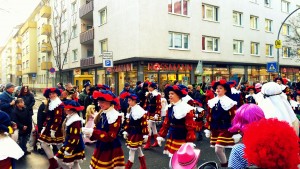
Returning Home:
Leaving Germany was not easy! When I left, it was the long awaited summer with big street festivals and sunsets at 11pm. I made a lot of great friends and had the best of times with them, and I have no idea when I will see them again.
On the other hand, I was also looking forward to going home and seeing my family and friends again! Of course also not having to pay €3 for a beer and to eat proper meat again!
As I landed in Cape Town International Airport, my family and I went straight home where we had a proper braai and I told them all about my exchange experience and travel stories. I saw a few friends at social events and they were all glad to see me! They wanted to hear all about my semester abroad, having seen my exchange photo’s on Facebook. And THAT is the moment you realise that it is nearly impossible to explain to them what you just experienced during the past six months. You, as well as your entire world, have grown SO much and it just can’t be put into words. Although you say it was an awesome experience and that you had such a great time abroad, nobody will fully understand the extent of what you mean.
To get back into routine also takes getting used to. The change in season from summer to winter, load shedding, no trains to catch and no Autobahn are suddenly new experiences, but South Africa is my home and always will be. Even with all the problems our country have, we still have a top-class lifestyle, loads of sunny days, good food and an incredibly beautiful country to live in. But Germany is and always will be my home away from home.
I leave you with the following words explaining how anyone who has spent a good time abroad feels like when returning home: “You will never be completely at home again, because part of you will always be elsewhere. That is the price you pay for the richness of loving and knowing people in more than one place.” Miriam Adeny.

